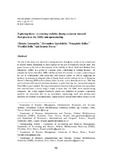| dc.contributor.author | Lemonakis, Christos | |
| dc.contributor.author | Garefalakis, Alexandros | |
| dc.contributor.author | Ballas, Panagiotis | |
| dc.contributor.author | Balla, Vassiliki | |
| dc.contributor.author | Passas, Ioannis | |
| dc.date.accessioned | 2022-01-25T10:56:50Z | |
| dc.date.available | 2022-01-25T10:56:50Z | |
| dc.date.issued | 2020-05 | |
| dc.identifier.issn | 2047-8747 | |
| dc.identifier.uri | http://hdl.handle.net/11728/12126 | |
| dc.description.abstract | Purpose – The aim of this study is to enrich the existing literature through the results of the research and to provide further information to policy-makers on the part of businesses and the state. This paper focuses on the role of determinants of the viability of Greek SMEs in a period of economic crisis, contributing to existing literature. We examine the factors that affect SMEs viability in times of economic recession; emphasizing on the use of collaborations with universities and research centers, as well as suggesting the tendency to maintain an adequate pillar of Equity funds and the widespread use of ERPs as tools to enhance firms’ activity, as key determinant factors. Design/methodology/approach – With data extracted from field research and from databases, a model function was constructed using the Fixed Effects panel method. The empirical analysis is based on both qualitative and quantitative data extracted from a survey using a sample of more than 150 Small and Medium-Sized (SMEs) Greek manufacturing companies. Findings – The results suggest businesses should take initiatives to promote cooperation networks for innovation and set up associations representing small and medium-sized enterprises to facilitate social interactions. Applied policies should better address business needs and provide realistic incentives (e.g. tax relief) to small and medium-sized enterprises with high innovation potential and encourage cooperation between universities and public and/or private research centers by introducing effective institutional and market-oriented arrangements. Research limitations/implications – Limitations on the generalizability of results stem from the selection of the sample. Availability of data before the burst of economic crisis in 2008 would facilitate comparisons of findings before and during economic turmoil. Also, utilizing data of SMEs in other sectors would enable cross-sectoral comparisons. Practical implications – The paper offers practical implications to SMEs in Greece regarding their effort to survive during the socioeconomic crisis that the country faces providing as a potential strategic decision to focus on innovation and on the cooperation with universities and research centers. Originality/value – The paper focuses on how SMEs in Greece could survive economic turmoil through collaborations with academic and research community as well as innovation, which could mitigate risks leading to accounting viability. | en_UK |
| dc.language.iso | en_US | en_UK |
| dc.publisher | CJEAS Ltd.; Production Faculty of Management Press, University of Warsaw | en_UK |
| dc.relation.ispartofseries | Interdisciplinary Journal of Economics and Business Law;vol. 9, no. 4, pp. 98-122, 2020 | |
| dc.rights | © 2020 CJEAS Ltd | en_UK |
| dc.rights.uri | http://creativecommons.org/licenses/by-nc-nd/4.0/ | en_UK |
| dc.subject | Research Subject Categories::SOCIAL SCIENCES::Business and economics | en_UK |
| dc.subject | Accounting viability | en_UK |
| dc.subject | Economic Crisis | en_UK |
| dc.subject | small and Medium-Sized Enterprises (SME's) | en_UK |
| dc.subject | Innovation economics | en_UK |
| dc.title | Exploring firms' accounting viability during economic turmoil: best practices for SMEs entrepreneurship | en_UK |
| dc.type | Article | en_UK |


